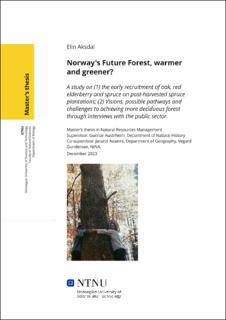| dc.description.abstract | Due to climate change and drought seasons, spruce Picea abies have started to dry out and die. This happened in Moss municipality in 2018, and since then they’ve wanted to find other options than spruce, in particular deciduous forest mainly comprised of oak Quercus robur. Climate change and invasive species are two large threats for today's forests, and restoring forest types important for biodiversity and sustainability can help mitigate this. Through interviews with 5 governmental and 2 non-governmental actors, and extensive field work on 4 former spruce dominant recently clear-cut sites in Moss municipality, the goal of this thesis is to figure out what the primary goal for these forests are, and look at the recruitment and interactions between oak, spruce, and red elderberry Sambucus racemosa. The results show huge recruitment for all species across all sites, with significant height differences as well. No other significant interactions where found. Through the interviews it was found that most respondents find recreation and biodiversity more important for a deciduous forest, while production is possible but requires more resources and extensive work compared to spruce plantations. Respondents also believed that forests will change no matter what we do because of climate change. Red elderberry was not considered a big threat by most of them. Active management may be necessary if a quality forest is desired, no matter if it is planned as a production forest or simply a recreational forest. Involvement of socio-ecological concepts is important for studies like these, and adapting to a more sustainable management of forest is necessary if we want to adapt to climate change.
Keywords: Spruce Picea Abies; Oak Quercus robeus; Red elderberry Sambucus racemosa; Deciduous Forest; Norway, Governmental perspectives; Forest ecosystem management; Pathways; Desired States; Climate change; Invasive species. | |
